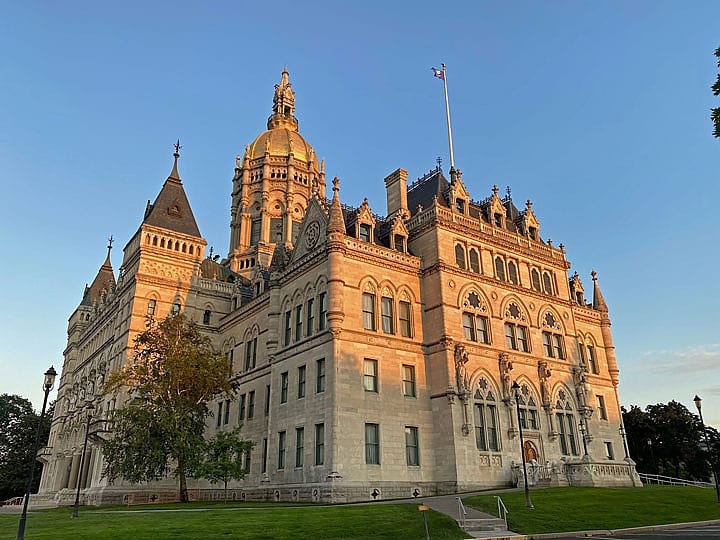Legislature Flexes Its Muscle with Future Executive Orders, Emergency Powers

Audio By Carbonatix

State Capitol. CTNewsJunkie.com file photo
Any extension beyond July 20 of Gov. Ned Lamont’s pandemic-related emergency authority will require vote of the full legislature.
By Hugh McQuaid, CTNewsJunkie.com
The Senate took a bipartisan vote Thursday night to grant legislative leaders the temporary power to reject pandemic-related executive orders from the governor and create a task force to consider changing Connecticut’s emergency declaration statutes.
The bill, passed unanimously by the House on Tuesday, was opposed in the Senate only by Sen. Mae Flexer, a Windham Democrat who is co-chairwoman of the Government Administration and Elections Committee, and Sen. Rob Sampson of Wolcott, who is the committee’s ranking Republican senator. Neither remarked on the legislation during a quick debate Thursday.
The bill will require votes by the full legislature in order to extend Gov. Ned Lamont’s pandemic-related emergency authority beyond July 20 and would set caps on the duration of future extensions.
The proposal comes on the heels of votes in both chambers this week to renew Lamont’s emergency authority until July 20. Lamont signed the bill approving the extension on Thursday. That extension, and others during the course of the pandemic, saw opposition from legislative Republicans. The proposal to which the Senate gave final passage on Thursday included some Republican ideas for curtailing the executive’s emergency authority.
“There has been differing of opinions on whether or not to extend the governor’s powers,” Sen. Paul Formica, R-East Lyme, said. “I think there’s been universal conversation about the fact that he’s done a pretty good job overall in managing this pandemic, but certainly there’s many of us in the General Assembly that thought that perhaps it shouldn’t always be extended.”
Until March 2022, the bill would give a panel of six legislative leaders the power to reject an executive order through a majority vote. Currently, that panel would include four Democrats and two Republicans.
The bill also creates a commission with members appointed by legislative Democrats and Republicans as well as the governor’s office to study the state’s two emergency declaration laws and make recommendations for reforming them.
“There have been a lot of lessons, I think we can all agree, learned from this pandemic. We’ve all struggled to figure out how to make this government run efficiently and safely,” Haskell said. He added that he hoped the work of the bill’s task force would see the public health and civil preparedness laws changed “so that we’re better prepared next time.”
Asked about the bill increasing legislative oversight of his emergency powers, Lamont noted the legislature has been in session since January and has had the ability to tweak his emergency orders as they saw fit. But he said he agreed with the new check.
“I think it’s appropriate that they have that oversight role,” Lamont said.
The governor has been operating with unprecedented executive authority since last March and has issued hundreds of executive orders in an effort to manage the state’s response to the pandemic. Several of those orders have been challenged and upheld in Connecticut courts. Recently the administration and lawmakers have worked to curtail the number of active orders. The administration has said it expects a limited number of remaining executive decrees to involve COVID vaccinations, testing, and continued qualification for federal aid.
Republished with permission from CTNewsJunkie.com, all rights reserved.
Like what you see here? Click here to subscribe to We-Ha’s newsletter so you’ll always be in the know about what’s happening in West Hartford! Click the blue button below to become a supporter of We-Ha.com and our efforts to continue producing quality journalism.



